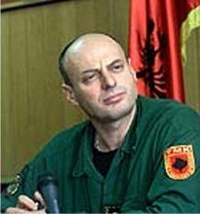Kosovo's PM vows to declare independence

Kosovo’s prime minister seems to not rely upon his allies in talks. He vowed Thursday to declare independence if internationally brokered talks fail to "open a way for us".
Officials said a breakthrough was unlikely. Kosovo's ethnic Albanian leadership demands full independence, while Serbia insists on retaining Kosovo as part of its territory.
The deadlock raises the likelihood of a dramatic showdown after Dec. 10, when 120 days of last-ditch negotiations called by U.N. Secretary General Ban Ki-Moon expire - and the international community is confronted with the possibility that Kosovo's Albanians will make a play for statehood on their own.
Kosovo Prime Minister Agim Ceku told The Associated Press: "No more delay. We cannot afford further uncertainty. We need a decision."
Ceku said he would press to "open a way for us to declare independence." If that doesn't happen, he said, "we have to declare, and we are going to ask the international community to recognize us."
But Serbia's minister for Kosovo, Slobodan Samardzic, said his delegation would offer only "essential autonomy."
"The independence of Kosovo is unacceptable for Serbia," Serbian President Boris Tadic said in Belgrade on the eve of the talks, calling for "a compromise and a sustainable solution acceptable to both sides."
Veton Surroi, a member of the Albanian delegation, described Thursday's talks as "fruitful" but underscored the growing impatience among Albanians, who account for 90 percent of Kosovo's 2 million people and expect independence by year's end.
"We cannot endlessly go on from one process to another," he said. "We're speaking not about the past. We're speaking about the future."
Although Kosovo remains formally part of Serbia, it has been run by the U.N. and NATO since 1999, when NATO airstrikes ended a Serbian military crackdown on ethnic Albanian separatists in the southern province.
A draft U.N. plan would have given Kosovo internationally supervised statehood. But Serbia bitterly opposed it, and Russia sided with Belgrade, effectively blocking its approval by the U.N. Security Council.
The latest attempt to get the two sides to agree is being brokered by the Contact Group, which includes the U.S., Britain, France, Germany, Italy and Russia.
"It's wrong to expect that revolutionary ideas will immediately emerge" from Thursday's closed-door session at the Austrian Foreign Ministry, said Alexander Botsan-Kharchenko, the Russian member of the so-called "troika" supervising negotiations along with U.S. and European Union envoys.
The troika diplomats, who also include U.S. diplomat Frank Wisner and EU representative Wolfgang Ischinger, were to meet with the Serbian contingent Thursday afternoon.
A flurry of similar talks is expected over the next few months as envoys shuttle between Belgrade and Pristina, Kosovo's provincial capital, trying to reconcile the two sides.
In his statement to the troika, Ceku warned against carving up Kosovo along ethnic lines.
"Everyone has agreed on the damage that would be caused by partition," he said.
But Ceku said that despite the Albanians' insistence on independence, "we are equally committed to building working relationships with our neighbors. We want to treat Serbia as an equal partner."
With tensions rising on both sides, the turbulent region could see renewed violence if Kosovo does not gain supervised independence, a leading think tank warned the EU earlier this month.
"With Kosovo Albanians increasingly restive and likely soon to declare unilateral independence in the absence of a credible alternative, Europe risks a new bloody and destabilizing conflict," the International Crisis Group said, urging the EU "to avoid chaos on its doorstep."
Subscribe to Pravda.Ru Telegram channel, Facebook, RSS!


